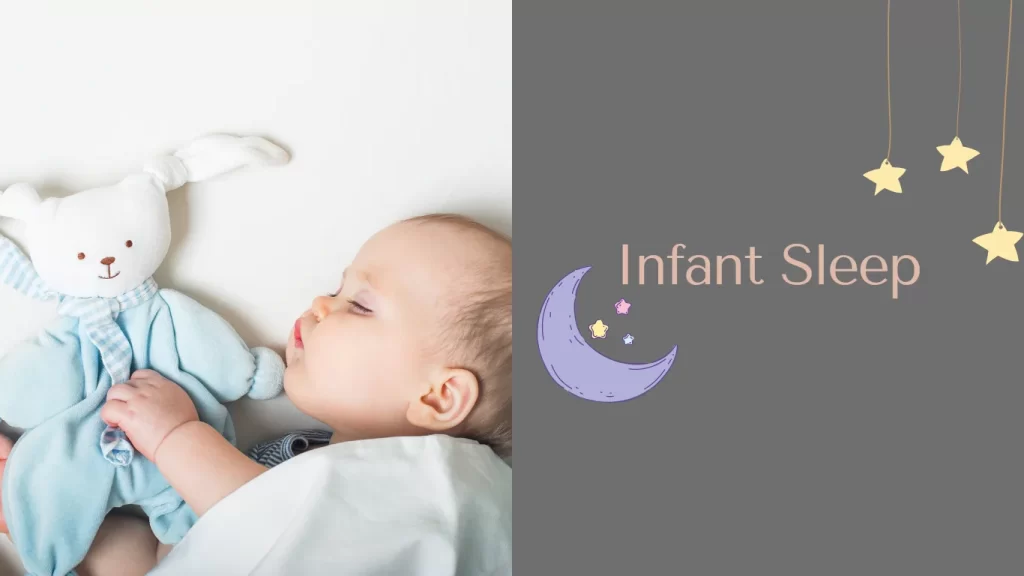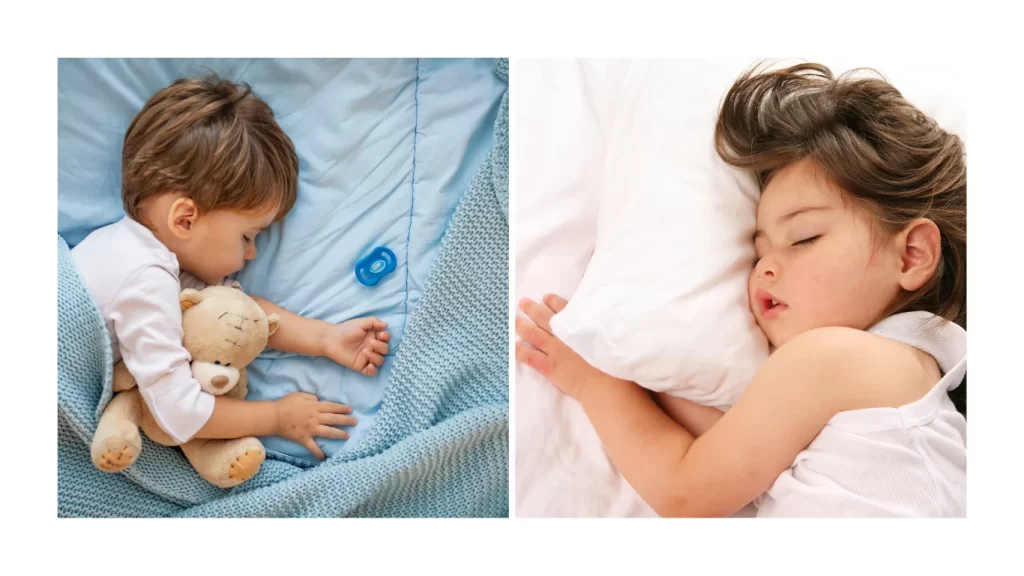Sleep is one of the most important aspects for a child, promoting health and well-being. We all know that a sleep-deprived child is different from a child who had a good night’s sleep. Children of different ages need varying amounts of sleep. Understanding children’s sleep and their needs at various ages is essential. Of course, every child is different; some need less sleep, and some require more. In today’s article, we’ll go through healthy sleep for all ages, from babies to toddlers to teenagers.
Sleep According to Age
Babies (4 months to 12 months old) 12 – 16 hours
Toddlers (1 to 2 years old) 11 – 14 hours
Children (3 to 5 years old) 10 – 13 hours
Children (6 to 12 years old) 9 – 12 hours
Teenagers (13 to 18 years old) 8 – 10 hours
Infants (Birth to 4 months)

Newborns need as much as 18 hours of sleep a day, usually 3 to 4 hours at a time, although this is not the case with all babies. Overnight feeds are completely normal for infants, and as they grow older, the wakes will be less often.
Similar to adults, babies need the proper cues to learn when to sleep. An example of a sleeping cue is putting the baby in their crib. This will teach the baby that crib time is sleeping time. Of course, the first time you do it, it may not work; however, over time, your baby will understand. The first few months of a baby’s life are unpredictable with sleep. After three months, a baby’s sleep habits will become more predictable.
Healthy sleep habit tips:
– An overtired baby will have more trouble sleeping. The more well-rested your baby is, the better night’s sleep he will get.
– Drowsy but awake is a concept many believe in, but it doesn’t always work for some. Drowsy but awake refers to putting the baby in its crib before it falls asleep; this essentially teaches the baby to fall asleep independently.
– If you find your baby wiggling throughout the night, try to let them settle themselves before calming them.
– Avoid turning on lights and interacting with your baby during overnight feeds as this will make it harder for them to fall back asleep.
Babies (4 to 12 months)
From four to twelve months, you can expect your baby to sleep 10 to 14 hours a day. Of course, each baby has different sleep needs, so anything less or more is also normal.
Most babies need three naps at four months; from six months to twelve, they go from three naps to two longer ones.
Healthy sleep habit tips:
– Stick with your regular bedtime and sleep schedule as much as possible.
– Be consistent with the bedtime routine you implement. Whether it be the three b’s, bath, book, bed or any other method.
– Avoid placing your baby in their crib with a bottle. First and foremost, it is a choking hazard, and second, it can lead to tooth decay.
Check out our Snoo Smart Sleeper Bassinet Review.
Toddlers (1 to 2 years)
Toddlers will usually sleep from 11 to 14 hours in 24 hours.
Healthy sleep habit tips:
– Keep with the sleep schedule that you established during the first year. At this age, the sleep schedule and routine are most important.
– Make sure they nap early in the day, and avoid late afternoon naps for your sake.
– Half an hour before bedtime should be relaxing. Try reading books or doing quiet activities during this time.

– Be gentle but stick to your word; this is the age of protests. I’m sure you’ve heard of the terrible twos.
– Keep the lights dim, and make the bedroom a quiet and cozy atmosphere.
– If your child likes it, you can play relaxing music to enhance the vibe.
– Security items implemented during the first year are essential at this age. Things such as a pacifier like the Phillips Avent Soothie, a stuffed animal or a blanket.
Children (3 to 5 years)

Preschoolers will usually need 10 to 13 hours of healthy sleep a day. They will probably need one solid nap a day at the three-year stage. There could be days where they don’t nap as well. This is the age where many parents will introduce quiet time, a time when the child will read a book, colour or relax.
It’s common for children at this age to have sleep problems and put up a fight before going to bed. This is normal and, over time, will pass.
Healthy sleep habit tips:
– Drinks with caffeine should be forbidden at this age.
– Screen time before bed is a big no-no.
– Children will make many efforts to delay bedtime, set limits on how many books they will read, etc.
– Bedtime fears at this age are expected; make sure to comfort and reassure them.
Conclusion – Healthy Sleep
Healthy sleep is essential for kids in all age groups. The right amount of sleep promotes proper growth and healthier, more energetic children overall. Different ages come with varying sleep struggles; however, they all pass over time. Throughout this article, we discussed sleep according to age, the sleep needs of infants and children; we reviewed some sleep habit tips for every age group to make the journey easier. We hope that we helped you understand your children’s sleep needs at varying ages.
What are some sleep problems that I may encounter with my kids?
There are many sleep problems that you may encounter; some of the most common are sleep deprivation, separation anxiety, and nightmares.
Sleep deprivation comes from a lack of sleep. Many believe the fewer naps their baby takes, the better they will sleep at night. This is not true. The more well-rested your child is, the better sleep he will get. If you find your child fussier than usual at night or have trouble staying asleep, consider putting them to bed earlier or paying attention to their daytime naps.
Separation anxiety is common in toddlers. They have trouble falling asleep because they know you won’t be there during their night’s sleep. Try a cuddle or one-on-one quality time before bed to satisfy their need for you to be there. Other things that may help are their security object or leaving a nightlight in their room.
Nightmares are common after a stressful event or due to a fever. They may cry out for you in the middle of the night. Be calm and reassure them that you’re here; hugs and reassuring words will often do the trick.
My child always has trouble falling asleep; should I be concerned?
If your child constantly has trouble falling asleep, make sure screen time ends at least an hour before bedtime. Avoid caffeine or sweets before bed, and lastly, aim to do relaxing activities such as reading books, lying in bed with your child, and telling them a story. All these things can help your child sleep faster.
What is considered healthy sleep?
Healthy sleep is different for all age groups. It refers to getting the right amount of sleep for your age group.





